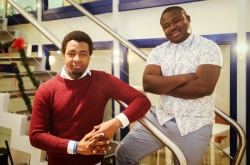Headache. Sometimes it feels like the microchip in my phone is faster than my brain, especially when in a new culture. Dealing with several languages at once, navigating local customs and also solving seemingly easy problems, like getting a taxi to a mall with five exits, gives me a headache that can last for a week. Ugh.
Coping strategy: Going for a run or a fast walk to physically help the muscles relax often helps with tension headaches. Eating well and getting enough sleep also helps. And asking for help - you don’t have to know everything and go it alone. Ask and you shall receive.
Familiar things taste differently. Even things like coffee or a burger, let alone specialties like tacos, can send your tastebuds screaming what?!! Yes, oftentimes there’s a local, creative take on what you might think is a staple. It might be because they’ve never had a chance to taste the authentic version or because the ingredients are different, but either way, there’s no point fighting it.
Coping strategy: Consider it part of your adventure. Get to know local foods and post them on Insta. Learn to cook.
Personal space. It’s a fact that different cultures have different concepts of personal space. I like to have space around me, so it takes me about a month to get used to taking the metro and people squeezing in right next to me on the bench, or worse, giving me a full-body embrace. I also can’t figure out if it’s appropriate to kiss when meeting someone or how two people can share a desk.
Coping strategy: On the metro, you can try leaning against the wall. In general, keep in mind that whatever people are doing, it’s not personal to you. I tend to take a step back, and avoid kisses.
Cultural blunders. From scheduling meetings before 11 am to buying coffee for friends who then feel awkward, it seems like my life in Russia is filled with oops moments.
Coping strategy: Russians are pretty forgiving when it comes to foreigners doing their foreign thing. Most likely they’ll try to accommodate you and make you feel better. But it might be a good idea to be more reactive, as opposed to proactive, until you feel more on the local wavelength.
Overall strategy: What you’re going through is normal. All of us, who have studied and worked in other countries, have had a similar experience, and in many ways it shaped who we are today.
So the consensus is to give yourself time, stay engaged (participate in events and clubs, do things with friends, connect with other expats) and consider it part of your adventure.




